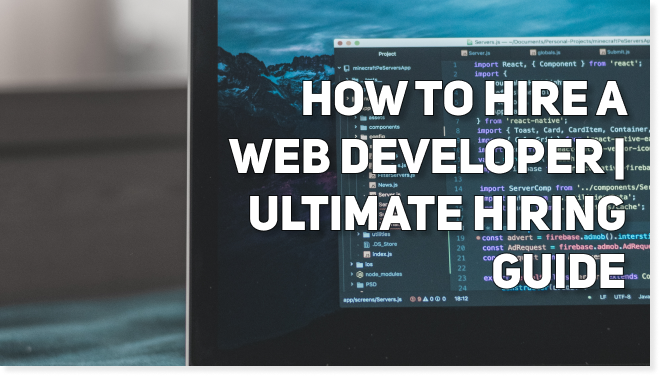
In this definitive guide, we’ll cover everything there’s to know about hiring a professional web developer for your project. You’ll learn the differences between web and app developers, front- and back-end developers, things to look for in developers’ CVs and pitfalls to avoid. By the end of the article, we’ll estimate how much money you need to allocate for developing a sample project and look at some of the best places to find pre-vetted screened freelance developers.
What Does a Web Developer Do?
Differences between a Web, App Developer, and Web Designer
Differences between Front-End, Back-End, and Full-Stack Developers
How to Find a Good Freelance Developer: Things to Look For
How Not to Hire a Freelance Developer: Things to Avoid
Web Developers for Hire: Best Places Where You Can Find Good Developers
Budget to Allocate for Web Development: Web Developers’ Rates
What Does a Web Developer Do?
Before we delve deeper into the topic of hiring the best developer for your project, it’s imperative for you to understand what developers actually do.
A web developer is a professional coder who, as the name suggests, develops, assembles, and codes a website, gets it online, optimizes its performance, tests, and maintains it.
Now, if you’re confused between different code names for professions, like web and app developer or designer, and who you might need for your project, then it’s a good idea to differentiate between the three and see what each can and cannot do.
Differences between a Web, App Developer, and Web Designer

If you want to build a website, there are usually two main components to the process: website design and website coding.
Web designers develop and create a website layout with images and all the necessary graphics in Adobe Photoshop, Illustrator, or any other similar graphics editor. Some of them do have solid coding knowledge, but others do not. So, the main point here is that a good website designer won’t necessarily be a good programmer or web developer, and consequently, a good web developer can be a bad designer.
Web developers are engineers with a solid knowledge of web development and coding, who can create a website, debug, test, and maintain it, as well as create some custom functionalities that a regular web designer won’t be able to do.
In case you’re interested in creating a mobile application for your site or any other project, then you may find our article on How and Where to Find the Best App Developers really helpful.
Now, when looking for a web developer, you might meet different names for the profession, like front-end, back-end, and full stack developers. How do you know which do you need exactly?
Differences between Front-End, Back-End, and Full-Stack Developers

Front-end developers specialize on the visible part of the website, back-end deals with the databases and infrastructure, and full stack actually deals with both.
Now, if you need to work on a large project, then you’d probably need a team of different developers specializing in different fields, both in front-end and back-end. If your project is rather small, then opting for a full-stack developer or a front-end developer with at least some back-end knowledge might sound like a better idea.
Full-stack developers don’t have extensive expertise in all front- and back-end technologies, but they have enough knowledge to build a functioning website or a Minimum Viable Product quickly.
The front-end developers are proficient in HTML & CSS (Bootstrap), JavaScript (Angular, React, Vue). Back-end skills include different programming languages, like Ruby (Ruby on Rails) and Python (Django, Flask). Frameworks are in brackets.
How to Find a Good Freelance Developer: Things to Look For

First, you need to understand what skills you need to look for.
These are examples of coder skills that are must-have for any good developer, especially front-end:
— HTML / HTML5
— CSS / CSS3
— JavaScript
Common CSS/JS libraries: jQuery, Bootstrap
Proficient in one of the following frameworks and understand the differences between them:
— React
— Angular
— Vue.js
For knowledge of back-end technologies, look for:
— Python (Flask/Django)
— Ruby (Ruby on Rails)
— PHP (Laravel/Symfony)
— Javascript (Node.js / Express)
You need at least some technical knowledge or understanding of what you’re trying to build and a clear vision of features you want in your application, website, or blog. It’s critical to understand what languages and frameworks you need your developer to have for your project. For example, if you need to build an e-commerce website, then a PHP programmer would be your best bet, and conversely, if you’re looking to develop an interactive web application, then the knowledge of Javascript and Node.js would be imperative.
Finding a web developer is not easy, finding a good one is even harder. The right developer would be able to deliver a bug-free, mobile-friendly, and fast website. These are the key components you want to outline in your job description so the person applying will know that they must possess the relevant skills to make the site speedy or friendly in a mobile environment.
What’s also important is finding a reliable freelance developer, who’s not going to put you on a back burner, because another client is paying more, or will be hard to reach for maintenance and support of your website in the future.
That is why it’s not such a great idea to look for a freelance developer on freelance platforms, such as UpWork, Freelancer, or Fiverr. I mean, we don’t have anything against those websites, in particular — some developers on the platforms are genuinely great, but it’s hard to find a needle in a haystack. Besides, those websites work as an auction with freelancers bidding on the job and sometimes the least qualified winning the battle.
Your project, or your website, is a living and breathing thing, that is why it will most certainly require maintenance, change of features, advanced customization, security checks, search optimization, new landing pages, opt-in integrations, forms, etc., on a monthly and sometimes daily basis. That is why having a reliable and available developer at all times is such an essential part of your business.
Another thing to keep in mind is that all developers have their own preferences — plug-ins they like to work with, templates, frameworks, tools, platforms, etc. — and if the developer disappears on you, then it might be hard to find another developer who’s ready to dive into someone’s else’s work, some would just prefer to stay away.
Thus, we recommend outlining in your job post the clear time frames of delivery of the final product, as well as the need for availability of a developer in the nearest future during and after the launch of a project.
If you understand programming, then you might challenge your prospective hire by using online coding tools, like CodeInterview — they have awesome pay as you go options with each interview priced at only $5, so you don’t need to subscribe to such “coding interview” moguls, like HackerRank.
As soon as you choose the developer you want to work with, make sure you explain your vision of the product and what you would like to see in the end. It’s okay to ask for regular updates from your freelancer, but don’t try to hover over their code or give unnecessary instructions, because you’re obviously not an expert. Instead, join GitHub premium and add your developer to your group, where they can share their code during the development and where you can see their regular updates. But that’s only for you to make sure your developer makes some baby-step progress every day and commits to the repository on a regular basis, not for your micromanaging or constant checking of the number of code lines the dev wrote.
How Not to Hire a Freelance Developer: Things to Avoid

To achieve a broader perspective, we decided to ask a question about pitfalls to avoid when hiring a web developer on Quora, and here’s the jest of some of the great answers we’ve received (some answers have been edited for clarity):
Gabriel Paunescu, MS Computer Science & Psychology, Stanford
Make sure you have a detailed plan of what you are trying to build. Big project, small project, doesn’t matter, just have the plan ready. Do hand mock-ups, decision tree whatever.
On the hiring side, stay away from high priced freelancers, refusing a test task is a red flag unless they have some cool projects on Git, then it’s fine.
Jonathan Hussey, Developing Magento 1 and 2 stores professionally since 2010
From a developers perspective, what I find the most useful when taking on a new project is the more information and detail the better. If once you have supplied as much detail as possible to the developer, you get back some positive feedback on how the developer plans to tackle the project. If you have doubts about the developer at this early stage, it’s possible they may not complete the work with the highest level of skill.
I often feel like there is an inherent, automatic distrust built into the thinking of many people looking to hire a freelance developer. That’s a real shame, but at times people have very good reason to feel that way because some freelancers can talk the talk, but in reality, are significantly lacking in the skills you hired them for.
I can’t count the number of times I have been called to ‘fix’ a badly developed Magento store where the client has had an experience like this, but the unfortunate reality is that the store owner was looking to have the work done on the cheap. I have never yet come across a store that has been badly developed by a developer charging a higher rate.
Ultimately like most things in life, with web development, you get what you pay for. A developer worth their salt is not just looking to make a quick buck by charging a higher rate, instead, they have spent many years educating themselves on doing the job to the absolute best ability they can.
Some people make the assumption that developers who charge an hourly rate are automatically looking to take advantage and charge the client over the odds for work done. I disagree with this. Over the years I have completed projects both at a fixed price, and at an hourly rate, and now I only work at the hourly rate. This is for a couple of reasons:
— I am a highly experienced developer and I feel completely justified in charging the hourly rate I do. I have spent many years learning and applying what I now know. If the client wants a job done well by an experienced developer then this is the cost.
— A fixed price project creates too much potential for conflict between developer and client: specs and requirements can regularly change as the project progresses, a client constantly pushes to get more work done for the same price. Sooner or later the working relationship will likely come to an end with both parties having a rather negative feeling about the whole affair.
Erik Olson, Inhuman Resources and Project Neurosurgeon at Effina Media
As part of planning, make sure you clarify what you mean by “done:” built, working as expected, tested, in production, etc.
— Write a functional spec. You might not know how (yet) but it’s worth learning.
— Plan on not having exactly what you want the first time. You will want to change things as you see things develop. If the developer balks at this expectation, don’t hire.
Usability and accessibility are way more important than they usually get credit for. In some sectors, failure to meet accessibility requirements results in fines or worse. If the developer minimizes the importance here, don’t hire.
— Set milestones. Work with the developer to meet expectations at given points. Tie payments to milestones; if they don’t deliver you’re not out the entire contract. You can even tie bonuses to milestones.
— Speaking of, get written contracts and explicitly specify what is covered under the contract. Don’t try to get sneaky with legalese but DO run it by a lawyer.
— Don’t pay an hourly rate. With hourly, you’re working to minimize the cost and they’re working to maximize it.
— Don’t cheap out on development work, fixing bad code is far more expensive (especially accounting for lost and/or wasted time).
From the answers we’ve received and from our own experience, we can now, therefore, make the following conclusions:
— Before hiring a web developer, create a detailed plan making sure you know what you need and want to achieve.
— Write functional specifications, describing how you see the product’s going to work from the user’s perspective: specify features, screens, dialogs, menus, etc. Speaking of technical specs, they mostly deal with data structures, choice of programming languages, etc. You might want to complete technical spec while communicating with your chosen developer.
— Establish a project timeframe and be prepared for changes or extensions.
— Test your developer’s knowledge, if you can. Or hire anyone proficient enough to check developer’s knowledge.
— Sign a viable contract approved by a lawyer.
— Now, the opinions on payment are different; we recommend hourly pay because your project can change and become more complex.
— Don’t cheap out. Fixing someone else’s code can just become even pricier.
Web Developers for Hire: Best Places Where You Can Find Good Developers
Now, we’ve already covered the best hiring platforms where you can find pre-vetted or pre-screened freelance app developers in our previous article on How to Find the Best App Dev. The same platforms (TopTal, CrossOver, Soshace, Hired, etc.) can be used for hiring remote web developers; some tech recruitment agencies offer only full-time devs, others: part-time, and onsite. So there are a ton of places where you can find good web developers with no-risk free trial periods when you can change your developer during a week or two without losing a penny.
Budget to Allocate for Web Development: Web Developers’ Rates

Different hiring platforms charge different rates. For example, in Soshace, developers’ rates start from $20 per hour. This is one of the fairest prices you can find on the web. However, depending on the web developer’s location, years of experience, skills, languages, portfolio, the difficulty of your project and other relevant factors, the prices can skyrocket and the rates can jump up to $60 and way above. Crossover, for example, provides a development team, which is usually about $125 per hour per team. Gun.io starts around $75 per hour. On the Upwork, you can find developers with prices as low as $15.
For example, say, you estimate your project to be at least 3 months of development works. You choose a developer for full-time remote work at a rate of $30 per hour. If all things being equal, expect to allocate the following budget: $30*40 hr (a week)*4(number of weeks)*3 (number of months) = $14,400.
Now, we’re pretty sure you’ve got this! You’re now well-prepared to hire the best pros out there. If you have something to add or share your experience with hiring freelance web developers, please, share your story in the comments!





